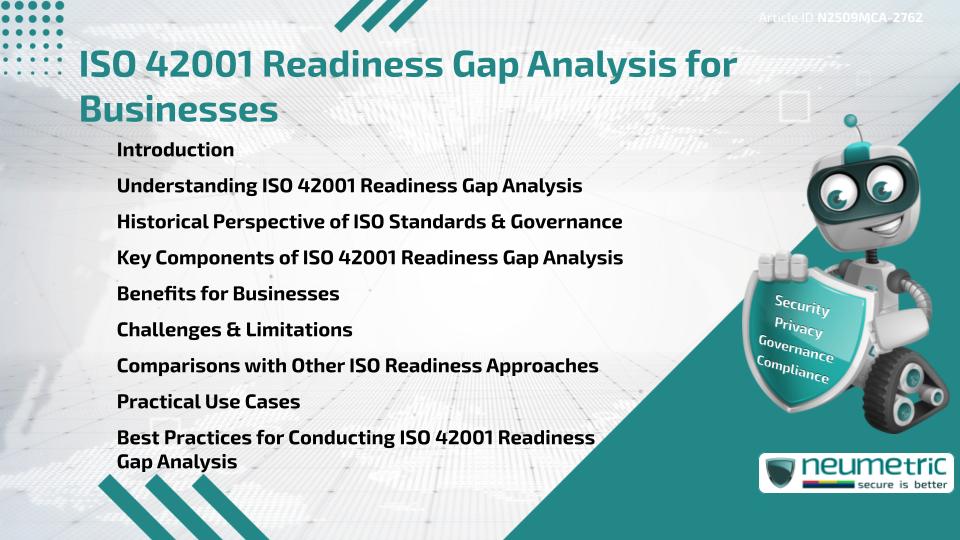Table of Contents
ToggleIntroduction
ISO 42001 readiness Gap Analysis enables businesses to evaluate their preparedness for adopting the ISO 42001 standard. By assessing current processes, Policies & systems against Standard requirements, Organisations can identify gaps & prioritise improvements. This proactive step ensures smoother Certification journeys, stronger Governance & enhanced compliance. This article explains the concept, history, components, benefits, challenges, comparisons & Best Practices of ISO 42001 readiness Gap Analysis.
Understanding ISO 42001 Readiness Gap Analysis
ISO 42001 readiness Gap Analysis is the structured evaluation of a company’s practices against the ISO 42001 requirements. It highlights areas where Organisations meet standards & where they fall short. The analysis provides a Roadmap for implementing Corrective Actions, ensuring readiness for external audits & Certifications.
Historical Perspective of ISO Standards & Governance
ISO standards have long provided frameworks for quality, security & environmental Governance. From ISO 9001 for Quality Management to ISO 27001 for Information Security, businesses have used these standards to improve processes & build trust. ISO 42001 continues this legacy, focusing on Artificial Intelligence Governance. Conducting a readiness Gap Analysis aligns Organisations with a tradition of structured, internationally recognized Governance practices.
Key Components of ISO 42001 Readiness Gap Analysis
Essential components of ISO 42001 readiness Gap Analysis include:
- Reviewing Governance & management structures
- Assessing Risk Management & accountability measures
- Evaluating Data Integrity & transparency Policies
- Comparing operational practices with ISO 42001 clauses
- Documenting compliance strengths & weaknesses
- Developing an action plan for closing identified gaps
These components form a foundation for businesses preparing for ISO 42001 Certification.
Benefits for Businesses
Conducting ISO 42001 readiness Gap Analysis benefits Organisations by:
- Identifying gaps early & preventing costly remediation later
- Improving Governance & accountability in AI Systems
- Enhancing trust among Stakeholders & Customers
- Supporting efficient Certification processes
- Strengthening overall compliance & Risk Management frameworks
Challenges & Limitations
Challenges of ISO 42001 readiness Gap Analysis include the need for specialized expertise, potential resource constraints & evolving interpretations of AI Governance. Smaller businesses may face difficulties balancing costs with the depth of analysis required. Additionally, without clear leadership commitment, the process may lose momentum.
Comparisons with Other ISO Readiness Approaches
Compared with readiness analyses for ISO 27001 or ISO 9001, iso 42001 readiness Gap Analysis addresses unique challenges related to Artificial Intelligence Governance. While the methodology is similar-assessing gaps & creating action plans-ISO 42001 emphasizes ethical, transparent & accountable AI Practices. This makes it particularly relevant for Organisations leveraging AI technologies.
Practical Use Cases
ISO 42001 readiness Gap Analysis is useful across industries adopting AI solutions. Technology companies apply it to validate Governance structures, while Healthcare Organisations use it to ensure ethical use of AI in patient care. Financial services firms leverage it to mitigate Risks in AI-driven decision-making systems.
Best Practices for Conducting ISO 42001 Readiness Gap Analysis
To perform effective ISO 42001 readiness Gap Analysis, Organisations should:
- Engage cross-functional teams including IT, compliance & leadership
- Conduct detailed reviews of Policies & operational practices
- prioritise remediation based on Risk & Business Objectives
- Use external consultants when internal expertise is limited
- Continuously monitor progress & update action plans
These practices improve the effectiveness of the analysis & prepare businesses for successful certification.
Conclusion
ISO 42001 readiness Gap Analysis provides businesses with a Roadmap to achieve compliance, strengthen Governance & build Stakeholder trust. By identifying gaps early, Organisations can align with the Standard efficiently & prepare confidently for certification.
Takeaways
- ISO 42001 readiness Gap Analysis highlights compliance gaps & Corrective Actions.
- It supports Governance, accountability & trust in AI Systems.
- Challenges include costs, expertise needs & evolving AI standards.
- Best Practices emphasize cross-functional involvement & Continuous Monitoring.
FAQ
What is ISO 42001 readiness Gap Analysis?
It is a structured evaluation of an organisation’s practices against ISO 42001 requirements to identify gaps & prepare for certification.
Why is ISO 42001 readiness Gap Analysis important?
It ensures Organisations are prepared for audits, strengthens AI Governance & reduces Risks.
How does it differ from other ISO readiness assessments?
It specifically addresses AI Governance, while other ISO frameworks focus on quality, security or environmental management.
What industries benefit most from ISO 42001 readiness Gap Analysis?
Technology, Healthcare & Finance industries where AI plays a critical role.
What challenges are associated with conducting the analysis?
Challenges include limited expertise, resource constraints & evolving interpretations of AI Governance.
Can Small Businesses conduct ISO 42001 readiness Gap Analysis?
Yes, but they may benefit from phased approaches or external consulting support to manage costs.
What Best Practices improve effectiveness?
Cross-functional collaboration, detailed documentation & Continuous Monitoring of progress.
Need help for Security, Privacy, Governance & VAPT?
Neumetric provides organisations the necessary help to achieve their Cybersecurity, Compliance, Governance, Privacy, Certifications & Pentesting needs.
Organisations & Businesses, specifically those which provide SaaS & AI Solutions in the Fintech, BFSI & other regulated sectors, usually need a Cybersecurity Partner for meeting & maintaining the ongoing Security & Privacy needs & requirements of their Enterprise Clients & Privacy conscious Customers.
SOC 2, ISO 27001, ISO 42001, NIST, HIPAA, HECVAT, EU GDPR are some of the Frameworks that are served by Fusion – a SaaS, multimodular, multitenant, centralised, automated, Cybersecurity & Compliance Management system.
Neumetric also provides Expert Services for technical security which covers VAPT for Web Applications, APIs, iOS & Android Mobile Apps, Security Testing for AWS & other Cloud Environments & Cloud Infrastructure & other similar scopes.
Reach out to us by Email or filling out the Contact Form…


